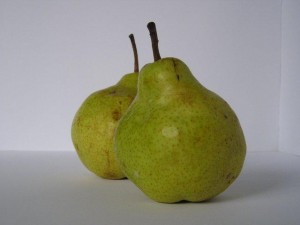
The pectin in pear and apple seeds can help remove toxins from the body [Image: Morguefile]
Kitchen cupboard solutions to a toxic world
21 February, 2012
By Pat Thomas
Natural Health News
It’s a dirty world out there!
Every day we are confronted with pollution and toxic chemicals in our environments. No matter how hard you try you can’t avoid everything. So how about strengthening yourself from the inside out?
The food you eat is often the first line of protection so consider these simple kitchen-cupboard solutions to combat everyday toxins:
- The pectin found in apple and pear seeds can protect your body from damage by toxic metals. It works by blocking the absorption of toxins while aiding detoxification. Try making apples or pears stewed with their seeds a regular feature of your diet.
- Garlic and onions contain powerful antioxidants that aid the body’s natural day-to-day efforts to detox. Use these liberally in cooking. Other sulphur-rich foods like broccoli and bile stimulants such as lemon and bitter greens also assist in detoxification.
- Peas, beans and lentils also contain unique antioxidants, and are high in fibre, which can bind to toxins and aid their excretion from the body. Pulses are a good alternative source of protein, so why not substitute a couple of meat meals each week for one based on (organic) pulses.
- A high-fibre diet in general is useful for trapping toxins and assisting in the elimination of heavy metals. Fibre helps reduce intestinal permeability, sometimes known as leaky gut – a condition that can lead to allergies and toxic build-up in the bloodstream. It also prevents deactivated from being reactivated and reabsorbed. Consider adding water-soluble, mucilaginous fibres such as psyllium seeds and flax seeds to your diet. These can be ground up, and added to cereals, soups and baked foods.
- Bananas are full of antioxidants and have a natural mild laxative quality. The pectin in them can aid detox of heavy metals.
- Eggs – specifically the whites – can help protect against lead and mercury contamination.
- Garlic has been shown to aid in the excretion of cadmium. It is best eaten fresh and uncooked (try crushing it or grating it into salads and dressings) to preserve its medicinal qualities, or it can be taken as a dietary supplement.
- All leafy dark-green vegetables, especially cruciferous vegetables (belonging to the cabbage family), can inhibit the carcinogenic effects of chemicals. Try to include plenty of kale, spinach, broccoli and Brussels sprouts in your diet. Other green foods that contain chlorophyll are also natural chelators that can draw heavy metals out of the system. Herbs like cilantro (coriander) are a great choice. A good way to take your greens is to buy a juicer and use it to make vegetable juices – they are not as sweet as fruit juices, but they pack more punch in the detox stakes.
- Seaweeds and alginates can also bind to heavy metals. There is evidence, for instance, that the freshwater green algae Chlorella can draw persistent chemicals, such as PCBs, out of the system. Similarly, research stretching back several decades shows that Arctic seaweeds are an aid to detoxification. These can be taken as supplements or added to your diet.
- Black tea is also thought to provide some protection from heavy metal toxicity – but evidence so far is only from animals. Similar results are likely with green tea.
Try to incorporate these items into your diet regularly to increase your dietary diversity but also as a first line defence against a toxic environment.

The pectin in pear and apple seeds can help remove toxins from the body [Image: Morguefile]

Top News Stories
Keep In Touch
Please subscribe me to your newsletter mailing list. I have read the
privacy statement


